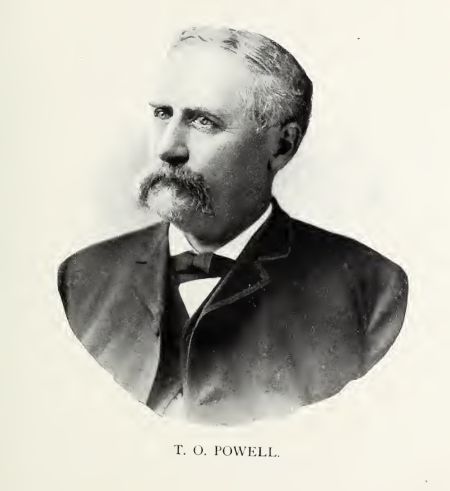 |
|
|---|---|
| Name: | Dr. Theophilus Orgain Powell |
| Born: | 1836-03-21 |
| Died: | 1907-08-18 |
| Nationality: | United States |
| Occupation: | Superintendent |
 |
|
|---|---|
| Name: | Dr. Theophilus Orgain Powell |
| Born: | 1836-03-21 |
| Died: | 1907-08-18 |
| Nationality: | United States |
| Occupation: | Superintendent |
Theophilus Orgain Powell was born 1836-03-21 in Brunswick County, Virginia. The son of Colonel Marcus D. Powell and Elisabeth Orgain Powell. His father was a planter, wealthy enough to give his son his a private tutor. His family’s ancestor was Nathaniel Powell, one of the earliest provincial governors of Virginia.
Powell’s family moved to Hancock County, Georgia when he was 7 and was educated at the school of Richard Malcolm Johnson. When Powell reached adulthood he began to teach school himself which provided him the money to go to Georgia Medical College in Augusta, Georgia, in 1859. Upon graduation he setup his private practice in Sparta, Georgia. On 1860-01-12 he married Miss Frances Augusta Birdsong. Together they had two children Julia and Harriet Summers. His private practice only lasted for two years, for the Civil War began and Dr. Powell enlisted in the 49th Georgia Regiment (made a private 1862-03-4). In 1862, he was made assistant surgeon of the regiment and then acting surgeon (1962-03, till 1862-04-19). By July he is noted as being on detached service to the state hospital.
In August 1862, he was asked to become the Assistant Physician of the Asylum. He worked at the asylum for 17 years as assistant physician, and in that time Dr. Powell and Green worked closely closely together and became close friends. In 1879, Superintendent Thomas F. Green died, and Dr. Powell was unanimously elected to the position of superintendent by the Trustees. By all accounts Dr. Powell was deeply impressed by the efficiency he witnessed in the military and it made a great impression on how he administered the hospital. In many ways though he was of the mind of Green on how the medical side of the hospital should be managed. Like Green, he continued the ban on restraints and interacted closely with the patients for whom he organized dances and games and other regular recreation.
Powell's tenure also saw a large increase in the number of patients entering the hospital. The problem was made worse by the policy of segregation, which forced the hospital to make separate quarters for white and black patients. This in reality meant that most of the hospital funds were used on the white patients and black patients were separately housed in heavily overcrowded buildings. This caused great problems in the long term as these buildings became fire-traps and allowed diseases to spread quickly due to the cramped conditions. In 1898 one of the colored buildings would burn to the ground and studies of the black population would show that up to 50% were dying due to tuberculosis.
Like Green, Powell had similar concepts on the cause and treatment of insanity. They both believed that the cause of insanity was mainly due to environmental factors, the most important of which was alcohol. Among the black population he believed that the rise in insanity was due to their new found freedom which had led their mental faculties to become overwhelmed due their "primitive" nature and the problem was made worse by their use of alcohol. All these causes were compounded for both races by the fact that these traits could passed on to offspring which was leading to the degradation of the human race. It is therefore easy to see that the asylum's future eugenics program had deep roots.
While in Tate Springs, Tennessee he died of Acute Pneumonia on 1907-08-18. The Central Building was renamed in his honor, and he was succeeded by Dr. L.M. Jones, an assistant physician of the hospital.
Cranford, Peter Gordon. But for the Grace of God: Milledgeville: Augusta, Ga.: Georgia Consumer Council, 1998.
Cook, Anna Maria (Green), and Leola Selman. Beeson. History of Baldwin County, Georgia. Anderson, S.C.: Keys-Hearn printing co., 1925. https//catalog.hathitrust.org/Record/000197537.
“Georgia: Hancock County: COMPANY I, 49th REGIMENT, Pierce Guards.” Accessed July 13, 2017. http://files.usgwarchives.net/ga/hancock/military/civilwar/rosters/coi49reg.txt.
Memoirs of Georgia; Containing Historical Accounts of the State’s Civil, Military, Industrial and Professional Interests, and Personal Sketches of Many of Its People. Atlanta, Ga., The Southern historical association, 1859. http://archive.org/details/memoirsofgeorgia01unse.